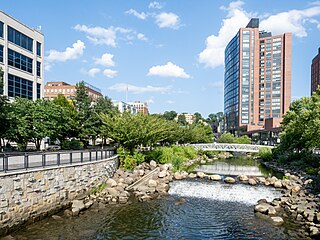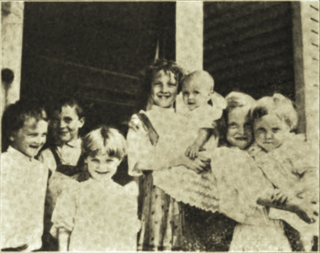Related Research Articles

Yonkers is the third-most populous city in the U.S. state of New York and the most-populous city in Westchester County. A centrally located municipality within the New York metropolitan area, Yonkers had a population of 211,569 at the 2020 United States census. Yonkers is classified as an inner suburb of New York City, immediately north of the Bronx and approximately 2.4 miles (4 km) north of Marble Hill.

The National Society Daughters of the American Revolution is a lineage-based membership service organization for women who are directly descended from a patriot of the American Revolutionary War. A non-profit group, the organization promotes education and patriotism. Its membership is limited to direct lineal descendants of soldiers or others of the American Revolution era who aided the revolution and its subsequent war. Applicants must be at least 18 years of age and have a birth certificate indicating that their gender is female. DAR has over 190,000 current members in the United States and other countries. The organization's motto was originally "Home and Country" until the twentieth century, when it was changed to "God, Home, and Country".

Getty Square is the name for downtown Yonkers, New York, centered on the public square. Getty Square is the civic center, central business district, and transit hub of the City of Yonkers. A dense and growing residential area, it is located in southern Westchester County, New York. The square is named after prominent 19th-century merchant Robert Getty.

Elizabeth Clarke Wolstenholme-Elmy was a British teacher, campaigner and organiser, significant in the history of women's suffrage in the United Kingdom. She wrote essays and some poetry, using the pseudonyms E and Ignota.

Yonkers Public Schools is a school district that serves all of Yonkers, New York, United States. It is governed by a mayorally appointed Board of Trustees.

Pace University is a private university with campuses in New York City and Westchester County, New York, United States. It was established in 1906 as a business school by the brothers Homer St. Clair Pace and Charles A. Pace. Pace enrolls about 13,000 students as of fall 2021 in bachelor's, master's and doctoral programs.

The Yonkers Public Library in Yonkers, New York, consists of three branch libraries. The main branch is the 'Yonkers Riverfront Library' which overlooks the Hudson River and New Jersey Palisades. Yonkers Riverfront Library is located in one of the former Otis Elevator buildings and it is across the street from the Yonkers train station. The new main library was opened in 2002, contains an area of 200,000 square feet (19,000 m2) and 4 stories.

Annie Turner Wittenmyer was an American charitable organization leader, known for social reform, relief work, and her writing. She served as the first National President of the Woman's Christian Temperance Union (WCTU), seventh National President of the Woman's Relief Corps (WRC), and also served as president of the Non-Partisan National Woman's Christian Temperance Union. In 2007, Wittenmyer was inducted into the Iowa Women's Hall of Fame.
The Heathen Woman's Friend was a Christian women's monthly newspaper. Established in May 1869, it was published by the Woman's Foreign Missionary Society of the Methodist Episcopal Church in Boston, Massachusetts. The monthly magazine describe conditions in the mission fields of the church, document the work of the society, and provide assistance to missionaries. The Heathen Woman's Friend was launched with volume 1, number 1 in May 1869. Its final issue, volume 27, number 6, was issued December 1895. The publication was relaunched as the Woman's Missionary Friend with volume 27, number 7 in January 1896, and ended with volume 73, number 7 in August 1940.
Charlotte Frances Wilder was an American writer. She was one of the most widely known writers of Kansas, and the author of many religious books, including for juvenile audiences, and a contributor to church papers and magazines. Her works -included in the Bibliothèque nationale de France, Paris- were "entitled to go down to posterity, her life-work preserved as information for future generations".

Elizabeth Morrison Harbert was a 19th-century American author, lecturer, reformer and philanthropist from Indiana. She was the first women to design a woman's plank and secure its adoption by a major political party in a U.S. state.

Catharine H. T. Avery was an American author, editor, and educator of the long nineteenth century. Of Revolutionary ancestry and hailing from Michigan, she was founder and regent of the Western Reserve Chapter of the Daughters of the American Revolution (DAR), of Cleveland, Ohio; Vice-president General of its National Society; and editor of the National Society's official organ, the American Monthly. She also served two years as a member of the Cleveland School Board, being the first woman in Ohio chosen to an elective office.

Ella M. S. Marble was an American physician who worked as a journalist, educator, and activist earlier in her career. From girlhood, she took an active interest in any movement calculated to advance the interests of women. Interested in literary and philanthropic work, Marble served as president of the District of Columbia Federation Womans' Clubs, numbering ten societies and 2,500 members ; president, District Federal; vice-president, Womans' National Press Association for state of Maine; president, Minnesota State Suffrage Association; president, Minneapolis City Suffrage Association; president, Washington City Suffrage Association; Secretary, Pro Re Noto; and secretary, White Cross Society of Minneapolis.

Grinton Ingham Will was an American library director of the Yonkers Public Library.

Fanny Purdy Palmer was an American author, poet, journalist, lecturer, social activist, and clubwoman. She began club work in 1876 and was one of the originators of the General Federation of Women's Clubs. She served as president of the Rhode Island Woman's Club, was a member of the school committee of the city of Providence, Rhode Island, and was connected with various philanthropic and social movements, including women's suffrage. A diligent reader of some of the best scientific and metaphysical works, for many years, she was a writer of stories which appeared in various weekly and monthly publications, stories which have dealt with the problems of life.
Helen Chadwick Thayer was an American suffragist and social reformer. A pioneer in the settlement movement era, she was a co-founder and president of the College Settlements Association (CSA). She was an alumnæ trustee of Smith College.

Neighborhood House was an American settlement house in Chicago, Illinois. It was opened in October 1896, by Samuel S. and Harriet M. Van Der Vaart, under the auspices of the Young People's Society of the Universalist Church, of Englewood, Chicago, and with the assistance of teachers of the Perkins, Bass, and D. S. Wentworth public schools. It was officially established in the Fall of 1897 by Harriet Van Der Vaart as the outgrowth of the kindergarten opened the year before "to bring together for mutual benefit people of different classes and conditions."
Whittier House was an American social settlement, situated in the midst of the densely populated Paulus Hook district of Jersey City, New Jersey. Christian, but non-denominational, its aims were to help all in need by improving their circumstances, by inspiring them with new motives and higher ideals, and by making them better fitted by the responsibilities and privileges of life. It cooperated with all who were seeking to ameliorate the human condition and improve the social order. It opened in the People's Palace, December 20, 1893. On May 14, 1894, it incorporated and moved to 174 Grand Street.

Lawrence House was an American social settlement in Baltimore, Maryland. Its beginnings were in 1893, when Rev. Dr. Edward A. Lawrence and a friend took up lodging at 214 Parkin Street. Lawrence died suddenly later in 1893, and in his memory, the Lawrence Memorial Association organized in 1894 and purchased a house at 816 West Lombard Street. The settlement incorporated in the Fall of 1900. In 1904, the place was enlarged by the addition of the adjoining house, 814 West Lombard Street.
References
- 1 2 3 4 5 French, Alvah P. (1925). "XXIV, WOMEN'S CLUBS AND ORGANIZATIONS OF THE COUNTY". History of Westchester County, New York. Lewis Historical Publishing Company, Incorporated. p. 521-42. Retrieved 25 January 2025.
 This article incorporates text from this source, which is in the public domain .
This article incorporates text from this source, which is in the public domain . - ↑ "Membership drive". The Herald Statesman. 24 December 1995. p. 4. Retrieved 26 January 2025.
- 1 2 "Woman's Institute of Yonkers". The Survey. Survey Associates: 8. May 1898. Retrieved 25 January 2025.
 This article incorporates text from this source, which is in the public domain .
This article incorporates text from this source, which is in the public domain . - ↑ "Getting Education in a Garden". The Craftsman. 26 (3). United Crafts: 289. June 1914. Retrieved 25 January 2025.
 This article incorporates text from this source, which is in the public domain .
This article incorporates text from this source, which is in the public domain .